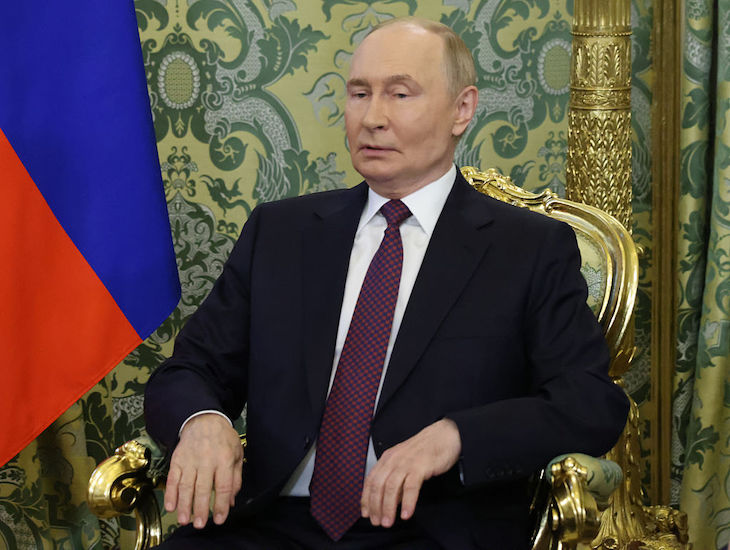The Kremlin’s accountants are having a problem: Russia’s state budget, once the engine of spectacular growth, is now flashing red. The mathematics are brutal. Russia’s fiscal deficit has ballooned to 3.7 trillion rubles in June – roughly £34 billion – skating perilously close to this year’s legal limit. As a share of GDP, the deficit threatens to breach the 1.7 per cent ceiling, a prospect that has Valentina Matviyenko, speaker of the Federation Council, preaching the gospel of ‘strict savings’ with all the enthusiasm of a Victorian governess.
The transformation of a petro-state into a war economy was supposed to demonstrate Russian resilience
The root of Moscow’s monetary malaise lies in spectacular overoptimism. Last September, officials confidently predicted a 2025 deficit of just 0.5 per cent of GDP, banking on Brent crude at $66 per barrel, robust 2.6 per cent growth, and a conveniently weak ruble at 100 to the dollar. Instead, they’ve watched their projections crumble fast.
In the first half of the year, oil and gas revenues, which fund more than a quarter of the Russian state, have collapsed by 17 per cent compared to last year and 25 per cent below projections. The market consensus for next year’s Brent prices hovers between $55 and $65 per barrel, below the government’s projections. Meanwhile, an unexpectedly strong ruble means fewer rubles per exported barrel, creating the peculiar problem of being too successful at currency strength.
The broader economy tells an equally grim tale. Growth has plummeted from a respectable 4.3 per cent in 2024 to 1.4 per cent in the first quarter of this year, with the Central Bank now forecasting sub-1.5 per cent growth for 2025. Lower growth translates to reduced VAT and income tax receipts, creating a vicious cycle that would make even Gordon Brown wince. Lower growth also means lower GDP, and with nominal fiscal deficit rising monthly, the 1.7 per cent legal threshold for this year’s deficit to GDP ratio has all the chances to be blown.
Putin’s bookkeepers face a difficult problem. The president promised not to raise taxes, ruled out meaningful currency devaluation (which would stoke inflation and increase government costs), and ringfenced defence, security, and social spending. What remains is a game of fiscal Jenga where removing the wrong piece brings down the entire structure.
Defence spending alone accounts for roughly $172 billion – 7.7 per cent of GDP – with little prospect of meaningful reduction. The stockpiles of Soviet weaponry that initially sustained the Ukraine campaign are running dangerously low, forcing expensive rearmament. The Kremlin has convinced itself that military production must remain the economy’s primary driver, a strategy worthy of Stalin planners’ applause, but expensive for the state finances.
With limited options, the government would be passing the fiscal burden to business and citizens with the subtlety of a Moscow traffic policeman. Companies face the prospect of losing subsidies while shouldering additional costs for security and social programmes: hardly conducive to investment or innovation. Citizens, meanwhile, can expect higher duties on vehicle registration, steeper excise taxes on life’s small pleasures, and increased fines. It’s austerity with Russian characteristics: brutal but presented as a patriotic duty.
The regime’s fiscal contortions reveal a deeper vulnerability.
In 2022, when sanctions first bit, Russian businesses and citizens queued cap-in-hand for state assistance, receiving generous help in exchange for war enthusiasm. Now the state coffers are running dry, but the enthusiasm must remain undimmed – dissent being rather more dangerous than bankruptcy in Putin’s Russia.
Two external threats loom large over this precarious balancing act. Should President Donald Trump make good on threats to throttle Russian oil trade, or should Brussels tighten technological sanctions, Moscow’s fiscal gymnastics could collapse entirely. The Kremlin has thus far managed to fund its war without triggering mass protests, but the margin for error is shrinking.
Putin’s great gamble – that Russia could outlast Western resolve while maintaining domestic stability – increasingly depends on economic alchemy. The transformation of a petro-state into a war economy was supposed to demonstrate Russian resilience. Instead, it may prove that even autocrats cannot indefinitely defy the laws of arithmetic.







Comments